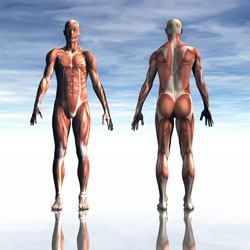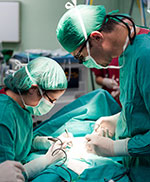![]()
Spasticity
Facts | Symptoms | Causes | Treatment options
Facts
Spasticity is a condition in which certain muscles are continuously contracted. This contraction causes stiffness or tightness of the muscles and can interfere with movement, speech and manner of walking.
Symptoms

Symptoms may include increased muscle tone, rapid muscle contractions, exaggerated tendon reflexes, muscle spasms, involuntary crossing of the legs and fixed joints. The degree of spasticity varies from mild muscle stiffness to severe, painful, uncontrollable muscle spasms. Spasticity can interfere with rehabilitation in patients with certain disorders and often interferes with daily activities.
Causes
Spasticity is usually caused by damage to the portion of the brain or spinal cord that controls voluntary movement. It may occur in association with spinal cord injury, multiple sclerosis, cerebral palsy, damage to the brain because of lack of oxygen, brain trauma, severe head injury and metabolic diseases such as Lou Gehrig's disease.
Treatment
Treatment for spasticity may include medication or physical therapy regimens that involve muscle stretching and range of motion exercises to help prevent shrinkage or shortening of muscles and to reduce the severity of symptoms. Surgery may be recommended for tendon release or to sever the nerve-muscle pathway.
Intrathecal pain delivery
Intrathecal drug delivery is a pain management method intended for those suffering from back pain. It is only recommended when nonsurgical treatments have failed. A thin, flexible tube (catheter) that is connected to a pump delivers small but effective amounts of pain medication to the intrathecal space surrounding in the spinal cord.
The pump is surgically placed into the abdomen. One end of the catheter is inserted into a pump and the other end into the targeted treatment area.
Because this procedure is invasive, complications may include infections, bleeding, pain and discomfort around the implant site, and blood (known as "hematoma") or fluid (known as "seroma") in the pocket where the pump is implanted. It is important that you discuss the potential risks, complications, and benefits of intrathecal drug delivery with your doctor prior to receiving treatment, and that you rely on your physician's judgment. Only your doctor can determine whether you are a suitable candidate for this treatment.
[top]








